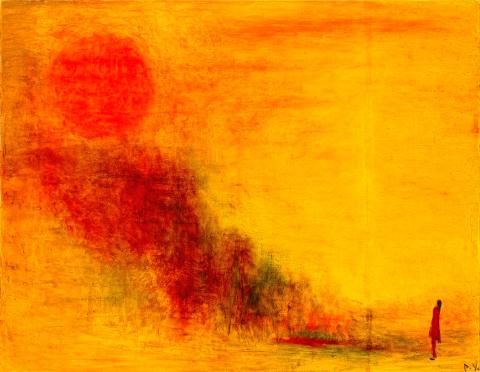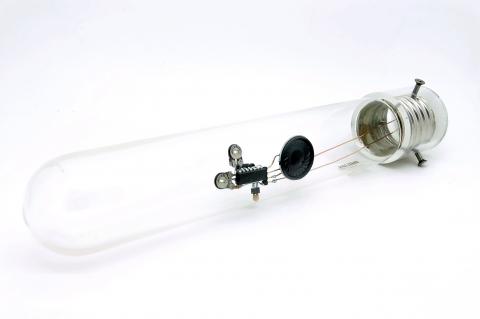Flawless (無缺) is a solo exhibition of wood sculptures by Miaoli County native Chiu Shih-fu (邱仕福). Chiu learned to chisel at age 13 as a child laborer and has worked in the industry for 47 years. He specializes in figures of humans and animals, styled in lyrical lines that echo western Romanticism. They typically appear in pairs so as to keep each other company, according to the gallery notes.
■ Sanyi Wood Sculpture Museum (三義木雕博物館), 88 Kuangsheng Hsincheng, Kuangsheng Village, Sanyi Township, Miaoli County (苗栗縣三義鄉廣盛村廣聲新城88號), tel: (037) 876-009. Open Mondays to Saturdays from 9am to 5pm. Admission: NT$80, NT$50 for Miaoli residents
■ Until Nov. 30

Photo Courtesy of Metaphysical Art Gallery
Sound State (聲態) collects new experiments by sound art pioneer Wang Fu-jui (王福瑞). Five pieces explore the possibilities of sound: One converts audio vibrations to visuals on a TV set, while another uses false computing protocols to generate true random noise that is emancipated from the machine. Wang is head of the Trans-Sonic Lab of the Taipei National University of the Arts and founder of Noise, the first noise/experimental music label in Taiwan.
■ Digital Art Center (台北數位藝術中心), 180 Fuhua Rd, Taipei City (台北市福華路180號), tel: (02) 7736-0708. Open Tuesdays to Sundays from 10am to 6pm, except Nov. 28 and Nov. 29. Free admission
■ Until Dec. 28

Photo Courtesy of DAC, Taipei
The Sun Never Sets (日不落) is a career retrospective for acclaimed oil painter Wang Pan-youn (王攀元). Born in 1911 in Jiangsu (江蘇), the artist immigrated in 1949 to Yilan County, where he still lives today. Wang’s war-shaped life story has appeared in his work as an inflammatory color palette and the use of negative space to create an aura of isolation.
■ Metaphysical Art Gallery (形而上畫廊), 7F, 219, Dunhua S Rd Sec 1, Taipei City (台北市敦化南路一段219號7樓), tel: (02) 2771-3236. Open Tuesdays to Sundays from 11am to 6:30pm, closed on Mondays
■ Opens tomorrow. Until Dec. 20
Coordinated with Switzerland’s Kindermuseum Creaviva at the Zentrum Paul Klee, Get Rhythm with Paul Klee is an interactive exhibit and workshop series for children aged 4 to 15. The program introduces youth to Swiss-German artist Paul Klee via game stations, painting studios and dance workshops led by the Cloud Gate Dance School. Klee is known for his striking use of color, lines, symbols and musical themes on the canvas, which help make his catalog accessible to children. To register for activities, visit www.tfam.museum/kid.
■ Children’s Art Education Center at the Taipei Fine Arts Museum, 181, Zhongshan N Rd Sec 3, Taipei (台北市中山北路三段181號), tel: (02) 2595-7656. Open Tuesdays to Sundays from 9:30am to 5:30pm and until 8:30pm on Saturdays. Admission: NT$30
■ Opens tomorrow. Until April 12
Greater Kaohsiung native Huang Hua-chen (黃華真) presents From Now On (全新的你), a mixed media solo exhibition inspired by the artist’s study abroad trip to Finland last year. In new paintings, installations and video work, Huang depicts seemingly sentient plants and gem-like carved rocks that exude warmth.
■ VT Art Salon (非常廟藝文空間), B1, 47 Yitong St, Taipei City (台北市伊通街47號B1), tel: (02) 2516-1060. Open Tuesdays through Thursdays from 1:30pm to 9pm, and Fridays and Saturdays from 1:30pm to 10pm
■ Until Dec. 6
My New Eros (我的新愛神EROS!) is a group show of photos themed on love (戀愛) or sexuality (性感). Contributors include professional photographer Jimmy Ming Shum (沈平林) from Hong Kong, as well as amateur shutterbugs such as talk-show host Huang Tzu-chiao (黃子佼). All proceeds from sales go to charity.
■ Little MOCA (微當代文創), 17, Ln 17, Chengde Rd Sec 1, Taipei City (臺北市承德路一段41巷17號), tel: (02) 2558-1787 Open Tuesdays to Sundays from 11am to 6pm
■ Until Dec. 27

Dissident artist Ai Weiwei’s (艾未未) famous return to the People’s Republic of China (PRC) has been overshadowed by the astonishing news of the latest arrests of senior military figures for “corruption,” but it is an interesting piece of news in its own right, though more for what Ai does not understand than for what he does. Ai simply lacks the reflective understanding that the loneliness and isolation he imagines are “European” are simply the joys of life as an expat. That goes both ways: “I love Taiwan!” say many still wet-behind-the-ears expats here, not realizing what they love is being an

Google unveiled an artificial intelligence tool Wednesday that its scientists said would help unravel the mysteries of the human genome — and could one day lead to new treatments for diseases. The deep learning model AlphaGenome was hailed by outside researchers as a “breakthrough” that would let scientists study and even simulate the roots of difficult-to-treat genetic diseases. While the first complete map of the human genome in 2003 “gave us the book of life, reading it remained a challenge,” Pushmeet Kohli, vice president of research at Google DeepMind, told journalists. “We have the text,” he said, which is a sequence of

Every now and then, even hardcore hikers like to sleep in, leave the heavy gear at home and just enjoy a relaxed half-day stroll in the mountains: no cold, no steep uphills, no pressure to walk a certain distance in a day. In the winter, the mild climate and lower elevations of the forests in Taiwan’s far south offer a number of easy escapes like this. A prime example is the river above Mudan Reservoir (牡丹水庫): with shallow water, gentle current, abundant wildlife and a complete lack of tourists, this walk is accessible to nearly everyone but still feels quite remote.

It’s a bold filmmaking choice to have a countdown clock on the screen for most of your movie. In the best-case scenario for a movie like Mercy, in which a Los Angeles detective has to prove his innocence to an artificial intelligence judge within said time limit, it heightens the tension. Who hasn’t gotten sweaty palms in, say, a Mission: Impossible movie when the bomb is ticking down and Tom Cruise still hasn’t cleared the building? Why not just extend it for the duration? Perhaps in a better movie it might have worked. Sadly in Mercy, it’s an ever-present reminder of just